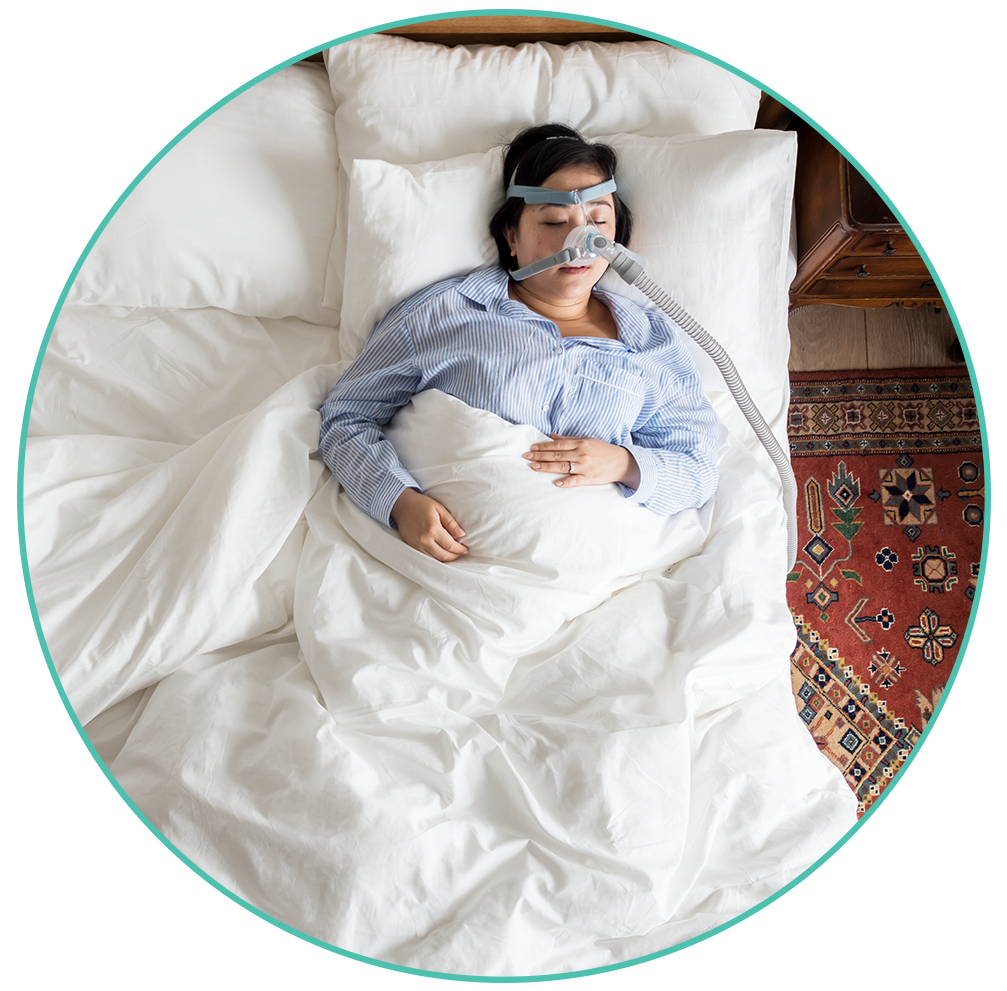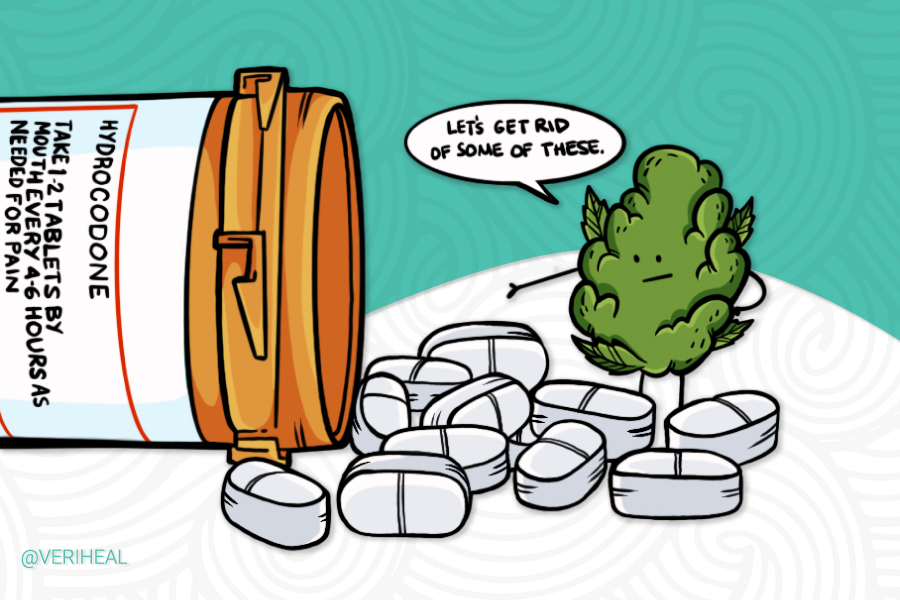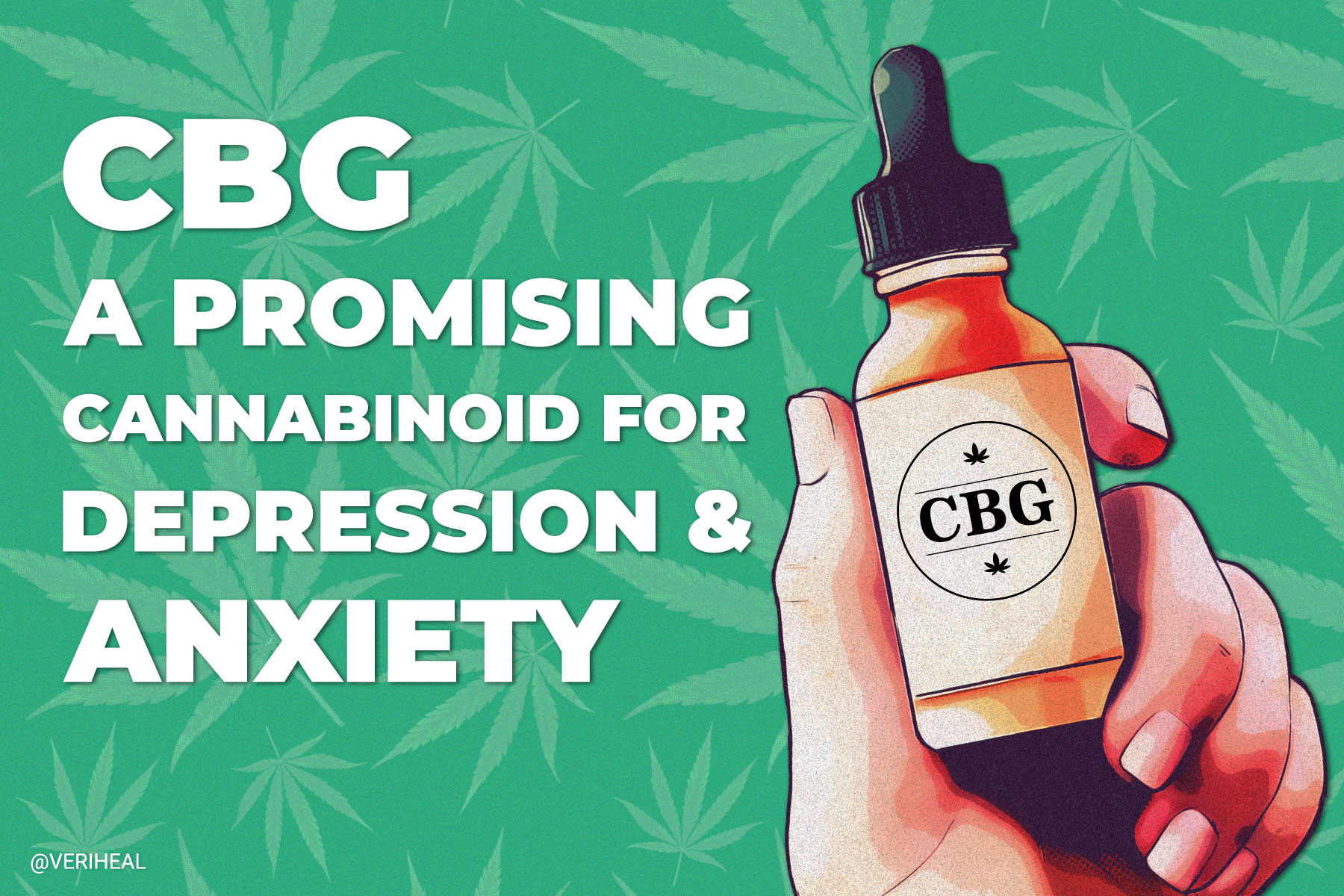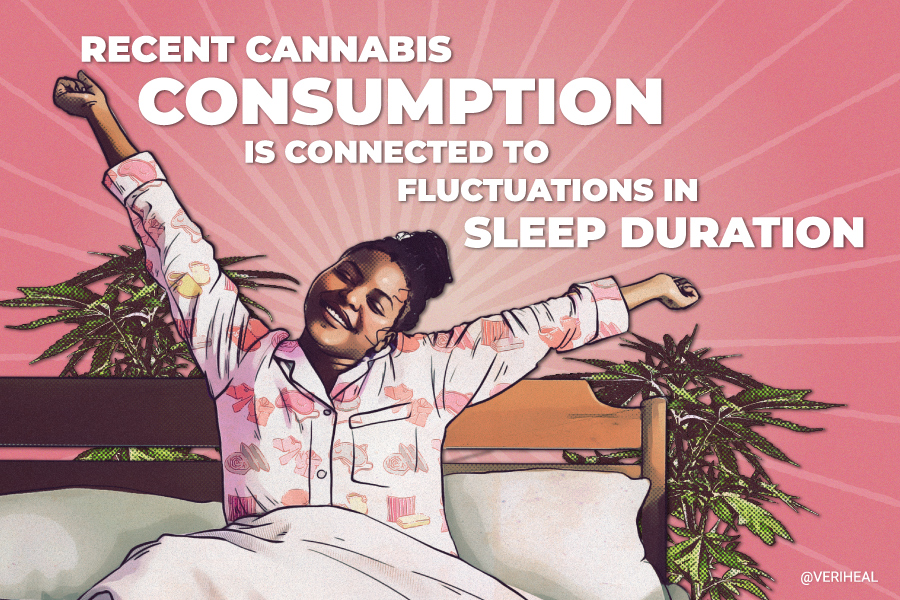Sleep Apnea and Medical Cannabis Treatment
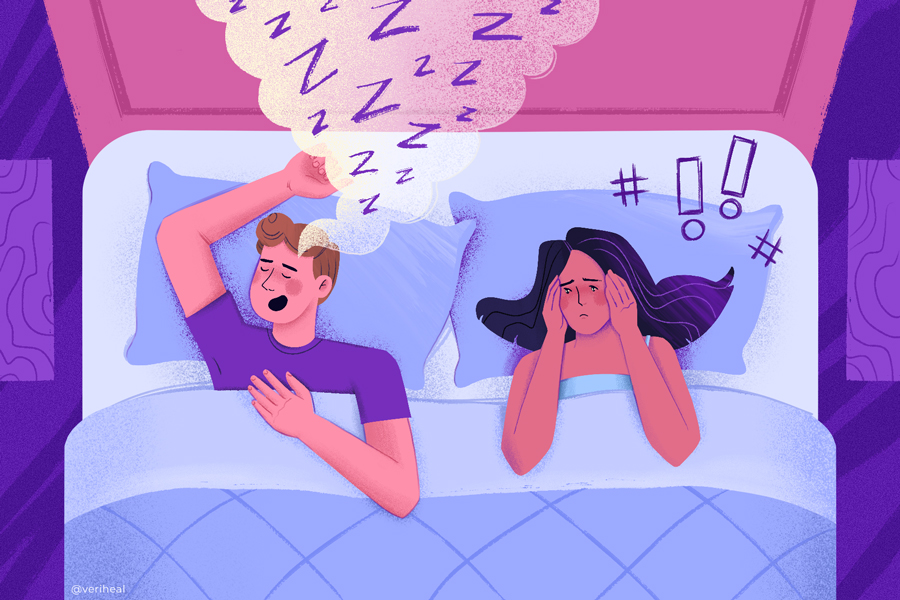
- Sleep Apnea Treatments: Medical Cannabis and More
- Sleep Apnea Risk Factors, Symptoms, and Complications
- The Endocannabinoid System (ECS) and Medical Cannabis
- Final Thoughts on Medical Cannabis to Treat Sleep Apnea
The disorder sleep apnea, when breathing starts and stops during unconsciousness, manifests in three types: obstructive sleep apnea (OSA), complex sleep apnea, and complex sleep apnea syndrome. OSA can significantly affect sufferers’ quality of life, making them feel fatigued after a full rest. Symptoms of OSA include loud snoring, gasping for air during sleep, daytime sleepiness, frequent naps, and difficulty paying attention while awake, according to the Mayo Clinic (11).
There are several types of treatment for obstructive sleep apnea that include lifestyle changes, which can include losing weight, cessation of smoking and alcohol consumption. Meanwhile, medical cannabis properties may alleviate obstructive sleep apnea, according to Medical News Today, which reported that a synthetic version of Delta-9 tetrahydrocannabinol (THC) called dronabinol may ease the condition (13).
Sleep Apnea Treatments: Medical Cannabis and More
There are several ways to treat obstructive sleep apnea. The most common treatment of obstructive sleep apnea is a continuous positive airway pressure (CPAP) machine or a different kind of oral appliance. CPAP therapy—with a CPAP machine—remains the best, most efficacious therapy to treat OSA at this time. Certain surgeries, including tissue removal, jaw repositioning, and nerve stimulation, also treat sleep apnea. Weight loss and exercise can be done in conjunction with other treatments.
Rather than using machines or undergoing surgery, medical marijuana could also prove to be a potentially beneficial treatment for those living with obstructive sleep apnea. The use and efficacy of dronabinol to treat sleep apnea was first studied in 2013 and published in the journal Frontiers in Psychiatry. The study stated that:
“Dronabinol treatment is safe and well-tolerated in OSA patients at doses of 2.5–10 mg daily,” according to the study, adding, “these findings should be confirmed in a larger study in order to identify sub-populations with OSA that may benefit from cannabimimetic pharmacologic therapy (16).”
A more recent phase-two study was published in 2017 in the journal Sleep. The University of Illinois at Chicago Professor of Biobehavioral Health Sciences David W. Carley used 73 adult participants to complete the study. Carley used three groups: one group dosed with low levels of dronabinol, a second group given high doses of the synthetic THC, and the last group administered a placebo. The results were conclusive.
“Those who took the highest dose, i.e., 10 milligrams of dronabinol, reported the highest satisfaction with the treatment, Medical News Today reported. “They showed decreased signs of subjective sleepiness and a lower incidence of apnea and hypopnea episodes (3). ”
Sleep Apnea Risk Factors, Symptoms, and Complications
Obstructive sleep apnea is caused by relaxed muscles in the back of the throat, which narrow airways and cause less blood oxygen flow, there are different risk factors for each type of sleep apnea. Obstructive sleep apnea risk factors include:
- Excess weight
- Neck circumference
- Older age
- Narrowed airway
- High blood pressure (hypertension)
- Chronic nasal congestion
- Smoking
- Diabetes
- Male Sex
- Family history
- Certain chronic medical conditions like asthma, CHF, PCOS, and more (12)
Central sleep apnea has not yet been studied in relation to medical cannabis. It is caused by a defect in sending signals from the brain to the breathing muscles, causing decreased breathing. Risk factors for this condition include:
- Older age
- Male sex
- Heart disorders like CHF
- Using narcotic pain medications like opioids
- Prior stroke
Risk factors for complex sleep apnea also include a history of stroke (11).
Common symptoms of obstructive sleep apnea (OSA) and often common to central sleep apnea include:
- Snoring
- Fatigue
- Daytime sleepiness
- Frequent nighttime awakenings
- Restless sleep
- Sudden awakenings with a sensation of gasping or choking
- Dry mouth or sore throat upon awakening
- Cognitive impairment (e.g. trouble concentrating, forgetfulness, irritability)
- Mood disturbances (e.g. depression or anxiety)
- Night sweats
- Frequent nighttime urination
- Sexual dysfunction
- Headaches (18, 11)
Complications of obstructive and central sleep apneas are serious and can include:
- Daytime fatigue and excess sleepiness, which can endanger driving and machinery operation
- Serious cardiovascular problems like stroke, heart failure, heart attack, and high blood pressure
- Type 2 Diabetes
- Metabolic Syndrome
- Liver problems and risk for NAFLD (non-alcoholic fatty liver disease)
- Complications with medications and surgery
- Eye problems (e.g. glaucoma)
- Sleep-deprived partners (12, 11)
OSA is also associated with motor vehicle accidents and a decrease in workplace productivity. Many people with OSA are undiagnosed or fail to seek treatment because they lack awareness of the disease, or because they are unenthusiastic about the potential treatment options, face stigma because of related symptoms, or fear of having their driver’s license revoked (15).
All of these complications can be serious and life-threatening. Therefore, prompt and proper consultation with a licensed healthcare professional is required to assess the extent of the disease, discuss currently approved treatments, patient sleep education, and suitable options for the patient. Medical cannabis is not FDA-approved for sleep apneas and cannot be a substitute for appropriate and ongoing personalized sleep medicine treatment. Appropriate treatment of sleep apnea includes long-term adherence and personalized follow-up to prevent these serious complications.
The Endocannabinoid System (ECS) and Medical Cannabis
A significant portion of the population suffers from poor sleep quality or sleep-related disorders (4). Sleep disorders are one of the most common reasons medical cannabis patients turn to medical marijuana along with conditions such as chronic pain and anxiety. As cannabis becomes more widely available for medical uses globally, there has been more research into the effects of cannabinoids such as ∆ 9 -tetrahydrocannabinol (THC) and cannabidiol (CBD) as treatments for a variety of sleep disorders (2).
A 2014 review of cannabis and sleep literature has found key mixed findings including:
- THC may decrease sleep latency but could impair sleep quality long-term
- Cannabinoids and obstructive sleep apnea suggest that synthetic cannabinoids such as nabilone and dronabinol may have short-term benefits for sleep apnea
- CBD may hold promise for REM sleep behavior disorder and excessive daytime sleepiness, while nabilone may reduce nightmares associated with PTSD and may improve sleep among patients with chronic pain
- Research on cannabis and sleep is in its infancy and has yielded mixed results (2)
Both THC and CBD interact with the endocannabinoid system, which is a complex network of cannabinoid 1 (CB1) and 2 (CB2) receptors and the endogenous ligands for these receptors such as anandamide (AEA) and 2- arachidonoylglyercol (2-AG). Noteworthy developments have been made by characterizing the modulatory role of the ECS in the sleep-wake cycle, especially in regards to aging (14). Research has shown that there are clear overlaps between the ECS system in the brain and sleep-wake circuitry. Evidently, endocannabinoids play a prominent role in sleep and cannabinoid drugs can alter these processes (8).
A study in 2002 revealed “potent suppression of sleep-related apnea by both exogenous and endogenous cannabinoids. These findings are of relevance to the pathogenesis and pharmacological treatment of sleep-related breathing disorders.” In this animal model study, THC stabilized airway respiration during all stages of sleep (3). While this may not necessarily extend to humans, it is a promising indication worthy of further exploration.
In contrast, a 2018 study on CBD found that CBD did not alter sleep architecture which does conflict with big picture findings. However, this study was done on healthy subjects and thus the effects could differ from people who already suffer from sleep disorders (9). Further research should investigate the differential effects of cannabinoids on sleep, sleep disorders, and sleep apneas. It is possible that a type I chemovar (THC-dominant) could be best for sleep apnea but more research is required to prove any benefits and determine long-term effects.
Medical Cannabis and Insomnia
Preliminary research into cannabis and insomnia suggests that cannabidiol (CBD), a cannabinoid from the cannabis plant, may have therapeutic potential for the treatment of insomnia and various other sleep disorders (2). Although research suggests that delta-9 THC may decrease the time it takes to fall asleep—also known as “sleep latency”— it could potentially impair sleep quality long-term.
A clinical trial in 2021 exploring treating insomnia with medical cannabis found that “two weeks of nightly sublingual administration of a cannabinoid extract (ZTL-101) is well tolerated and improves insomnia symptoms and sleep quality in individuals with chronic insomnia symptoms.” This placebo-controlled, randomized trial provides promising evidence for medical cannabis and its potential to help treat sleep disorders (20).
Other larger systematic reviews on cannabis and sleep have also shown therapeutic potential for cannabinoids like THC, CBD, and nabilone for sleep disorders.
Medical Cannabis and Anxiety and Depression
As stated previously, many patients that live with OSA may experience anxiety or depression as side effects of their sleep disorder. A 2018 study on the potential of cannabis to effectively reduce anxiety found that anxiolytic—anxiety-reducing— effects of cannabis may be dependent on a variety of factors on the strain, terpenes, and the THC: CBD ratio (7).
Specifically, the study stated that delta-9 tetrahydrocannabinol (THC)—characterized by its psychotropic effects—in low doses reduced anxiety, but heightened anxiety in higher doses. Cannabidol (CBD) appears to decrease anxiety more universally, perhaps due to the absence of psychoactive effects and negative side effects most associated with delta-9 THC such as paranoia or anxiety.
A more recent study that explored the antidepressant and anxiolytic effects of medicinal cannabis use found that “medicinal cannabis use was associated with lower self-reported depression,” and that, “medicinal cannabis users also reported superior sleep, quality of life, and less pain on average. Initiation of medicinal cannabis during the follow-up period was associated with significantly decreased anxiety and depressive symptoms, an effect that was not observed in Controls that never initiated cannabis use (10).”
The study concluded that cannabis use may reduce anxiety and depressive symptoms in clinically anxious and depressed populations, although they noted that future placebo-controlled studies were needed to replicate these results.
Medical Cannabis and Pain Management
Both intermittent hypoxia—an absence of oxygen in the tissues to sustain bodily functions— and sleep disruption enhance pain in the body. Therefore chronic pain management is often part of treatment for many patients living with OSA, and female patients with OSA in particular (1).
According to one study “The intrinsic nature of opioids to suppress respiratory function is of particular concern among patients with obstructive sleep apnea (OSA) (5).” Alternative drugs and therapies such as medical cannabis may help patients living with OSA manage chronic pain without any of the risks that opioids present in this specific population.
Final Thoughts on Medical Cannabis to Treat Sleep Apnea
While medical cannabis has substantial evidence that supports the treatment of the previous conditions. It’s important to note the American Academy of Sleep Medicine’s official position statement at this time regarding treating sleep disorders, specifically OSA, with medical cannabis:
“…it is the position of the American Academy of Sleep Medicine (AASM) that medical cannabis and/or its synthetic extracts should not be used for the treatment of OSA due to unreliable delivery methods and insufficient evidence of effectiveness, tolerability, and safety. OSA should be excluded from the list of chronic medical conditions for state medical cannabis programs, and patients with OSA should discuss their treatment options with a licensed medical provider at an accredited sleep facility. Further research is needed to understand the functionality of medical cannabis extracts before recommending them as a treatment for OSA (17).”
While more research and clinical trials are conducted regarding medical cannabis and sleep apnea, those who suffer from it find new hope in recent discoveries that promise new relief.
Sleep apneas are a group of serious, insidious diseases that can be fatal in the long term if not treated appropriately by a healthcare professional whether by CPAP or other approved treatments. Medical cannabis is not an approved treatment for any apneas at this time. Always seek guidance from your provider for any health or sleep-related concerns.
Note: Veriheal does not intend to give this as professional medical advice. Do not attempt to self-diagnose, or prescribe treatment based on the information provided on this page. Always consult a physician before making any decision on the treatment of a medical condition.
1. Aytekin, E., Demir, S. E., Komut, E. A., Okur, S. C., Burnaz, O., Caglar, N. S., & Demiryontar, D. Y. (2015). Chronic widespread musculoskeletal pain in patients with obstructive sleep apnea syndrome and the relationship between sleep disorder and pain level, quality of life, and disability. Journal of Physical Therapy Science, 27(9), 2951–2954. https://www.ncbi.nlm.nih.gov/pmc/articles/PMC4616133/#:~:text=A%20recent%20retrospective%20study%20showed,in%20the%20study%20were%20male
2. Babson, K. A., Sottile, J., & Morabito, D. (2017). Cannabis, cannabinoids, and sleep: A review of the literature. Current Psychiatry Reports, 19(4). https://pubmed.ncbi.nlm.nih.gov/28349316/
3. Carley, D. W., Prasad, B., Reid, K. J., Malkani, R., Attarian, H., Abbott, S. M., Vern, B., Xie, H., Yuan, C., & Zee, P. C. (2017). Pharmacotherapy of apnea by Cannabimimetic Enhancement, the pace clinical trial: Effects of dronabinol in obstructive sleep apnea. Sleep, 41(1). https://pubmed.ncbi.nlm.nih.gov/12071539/
4. Colten, H. R., & Altevogt, B. M. (2006). Sleep disorders and sleep deprivation: An unmet public health problem. National Academies Press. https://books.google.com/books?hl=en&lr=&id=3bVTAgAAQBAJ&oi=fnd&pg=PT39&ots=jvrYijo1Qo&sig=RcVAGC-OdhBTxdSx45zxqu6DiyA#v=onepage&q&f=false
5. Cozowicz, C., Chung, F., Doufas, A. G., Nagappa, M., & Memtsoudis, S. G. (2018). Opioids for acute pain management in patients with obstructive sleep apnea. Anesthesia & Analgesia, 127(4), 988–1001. https://journals.lww.com/anesthesia-analgesia/Fulltext/2018/10000/Opioids_for_Acute_Pain_Management_in_Patients_With.28.aspx
6. Gottlieb, D. J., & Punjabi, N. M. (2020). Diagnosis and management of obstructive sleep apnea. JAMA, 323(14), 1389. https://www.google.com/url?q=https://doi.org/10.1001/jama.2020.3514&sa=D&source=docs&ust=1647885412768960&usg=AOvVaw31–B8BtJixn_ChQJ54wfP
7. Kamal, B. S., Kamal, F., & Lantela, D. E. (2018). Cannabis and the anxiety of fragmentation—a systems approach for finding an anxiolytic cannabis chemotype. Frontiers in Neuroscience, 12. https://www.ncbi.nlm.nih.gov/pmc/articles/PMC6204402/
8. Kesner, A. J., & Lovinger, D. M. (2020). Cannabinoids, endocannabinoids and sleep. Frontiers in Molecular Neuroscience, 13. https://www.ncbi.nlm.nih.gov/pmc/articles/PMC7388834/
9. Linares, I. M., Guimaraes, F. S., Eckeli, A., Crippa, A. C., Zuardi, A. W., Souza, J. D., Hallak, J. E., & Crippa, J. A. (2018). No acute effects of cannabidiol on the sleep-wake cycle of healthy subjects: A randomized, double-blind, placebo-controlled, crossover study. Frontiers in Pharmacology, 9. https://www.ncbi.nlm.nih.gov/pmc/articles/PMC5895650/
10. Martin, E. L., Strickland, J. C., Schlienz, N. J., Munson, J., Jackson, H., Bonn-Miller, M. O., & Vandrey, R. (2021). Antidepressant and anxiolytic effects of medicinal cannabis use in an observational trial. Frontiers in Psychiatry, 12. https://pubmed.ncbi.nlm.nih.gov/34566726/
11. Mayo Foundation for Medical Education and Research. (2020, July 28). Sleep apnea. Mayo Clinic. Retrieved February 24, 2022, from https://www.mayoclinic.org/diseases-conditions/sleep-apnea/symptoms-causes/syc-20377631
12. Mayo Foundation for Medical Education and Research. (2021, July 27). Obstructive sleep apnea. Mayo Clinic. Retrieved February 28, 2022, from https://www.mayoclinic.org/diseases-conditions/obstructive-sleep-apnea/symptoms-causes/syc-20352090
13. MediLexicon International. (n.d.). Cannabinoid drug found effective for treating sleep apnea. Medical News Today. Retrieved March 21, 2022, from https://www.medicalnewstoday.com/articles/320240#Testing-dronabinol-in-sleep-apnea-patients
14. Murillo-Rodríguez, E., Budde, H., Veras, A. B., Rocha, N. B., Telles-Correia, D., Monteiro, D., Cid, L., Yamamoto, T., Machado, S., & Torterolo, P. (2020). The endocannabinoid system may modulate sleep disorders in aging. Current Neuropharmacology, 18(2), 97–108. https://www.ncbi.nlm.nih.gov/pmc/articles/PMC7324886/
15. Osman, A. M., Carter, S. G., Carberry, J. C., & Eckert, D. J. (2018). Obstructive sleep apnea: Current perspectives. Nature and Science of Sleep, Volume 10, 21–34. https://www.ncbi.nlm.nih.gov/pmc/articles/PMC5789079/
16. Prasad, B., Radulovacki, M. G. M. D., & Carley, D. W. (1AD, January 1). Proof of concept trial of dronabinol in obstructive sleep apnea. Frontiers. Retrieved February 24, 2022, from https://www.frontiersin.org/articles/10.3389/fpsyt.2013.00001/full
17. Ramar, K., Rosen, I. M., Kirsch, D. B., Chervin, R. D., Carden, K. A., Aurora, R. N., Kristo, D. A., Malhotra, R. K., Martin, J. L., Olson, E. J., Rosen, C. L., & Rowley, J. A. (2018). Medical cannabis and the treatment of obstructive sleep apnea: An American Academy of Sleep Medicine Position statement. Journal of Clinical Sleep Medicine, 14(04), 679–681. https://jcsm.aasm.org/doi/full/10.5664/jcsm.7070
18. Sleep apnea: Causes, symptoms, tests & treatments. Cleveland Clinic. (n.d.). Retrieved March 21, 2022, from https://my.clevelandclinic.org/health/diseases/8718-sleep-apnea#:~:text=If%20it’s%20not%20treated%2C%20sleep,failure%2C%20diabetes%20and%20heart%20attacks 19. Suraev, A. S., Marshall, N. S., Vandrey, R., McCartney, D., Benson, M. J., McGregor, I. S., Grunstein, R. R., & Hoyos, C. M. (2020). Cannabinoid therapies in the management of sleep disorders: A systematic review of Preclinical and Clinical Studies. Sleep Medicine Reviews, 53, 101339. https://www.sciencedirect.com/science/article/abs/pii/S1087079220300824?via%3Dihub
20. Walsh, J. H., Maddison, K. J., Rankin, T., Murray, K., McArdle, N., Ree, M. J., Hillman, D. R., & Eastwood, P. R. (2021). Treating insomnia symptoms with medicinal cannabis: A randomized, crossover trial of the efficacy of a cannabinoid medicine compared with Placebo. Sleep, 44(11). https://pubmed.ncbi.nlm.nih.gov/34115851/












